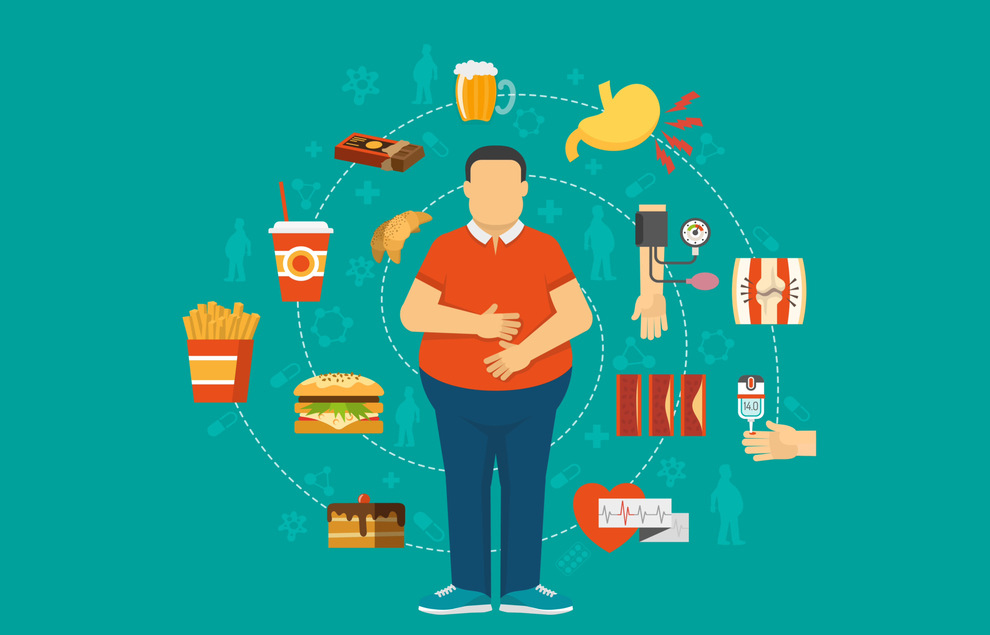According to 'WHO', obesity has nearly tripled since 1975 worldwide.
In 2016, more than 1.9 billion adults (18 years and older) were overweight. Of these over 650 million were obese. Most of the world's population live in countries where overweight and obesity kills more people than underweight.
What do obesity and overweight mean?
Overweight and obesity are defined as excessive or abnormal fat accumulation in the body. It is a complex disease. It is a medical problem that increases the risk of diseases related to heart disease, diabetes and high blood pressure.
There are several reasons behind being overweight and obese. In most cases, obesity is the result of inherited, physiological, and environmental factors combined with dietary choices, physical activity, and exercise habits.
How to check obesity?
The body mass index (BMI) is commonly used to classify overweight and obesity. This is a simple weight-to-height index. Basically, it is the ratio between a person's weight in kilograms and his height in meters (kg/m2).
For adults, 'WHO' defines overweight and obesity as follows:
- Overweight is a BMI greater than or equal to 25.
- Obesity is a BMI greater than or equal to 30.
What are the causes of obesity and overweight?
- The difference between calories consumed and calories expended is the main reason behind obesity and overweight. Obesity occurs when you consume a higher amount of calories than what you burn, through daily activities and exercises. Your body stores that excess calories as fat!
- Stress is one of the reasons for obesity. In today's chaotic life, many people have jobs of eight to ten hours with less physical activity, so they don't tend to burn as many calories as they should. Remote controls, escalators, online shopping, drive-through banks, and other conveniences help reduce calorie intake even during daily activities.
- Genetics plays an important role in obesity. People with obesity in genes have a higher risk of being obese and overweight.
- Metabolism could be another reason for obesity. People with slow metabolism store more calories than people with faster metabolism. Metabolism depends on body types. There are three types of body types according to BMR (basal metabolic rate): ectomorph, mesomorph and endomorph.
- Additionally, behavioural and hormonal imbalances are factors responsible for obesity and being overweight.
What are the common health complications of overweight and obesity?
Obesity and overweight invite various non-communicable diseases such as:
- Cardiovascular diseases: Obesity causes high blood pressure and high levels of cholesterols, which causes heart diseases and strokes.
- Type 2 diabetes: Obesity raises the risk of insulin resistance and it leads to diabetes.
- Certain types of cancer: The risk of cancer of the uterus, cervix, endometrium, ovary, breast, colon, rectum, oesophagus, liver, gallbladder, pancreas, kidney and prostate are higher in people with obesity.
- Musculoskeletal disorder: People with obesity and overweight have a higher chance of musculoskeletal disorders, especially osteoarthritis.
Digestive problems, sleep apnea and severe COVID-19 symptoms are some other health complications of being obese or overweight.
How do obesity and overweight affect the quality of life?
Being obese and overweight directly affects your quality of life. It is impossible for you to perform the sports activity that you would have enjoyed. You may avoid public places. Discrimination may even be experienced by obese people. In addition to that, depression, disability, shame and guilt, social isolation and lower productivity at work are some common activity that affects your quality of life.
How to reduce overweight and obesity?
Obesity and overweight can be preventable. Choosing healthy and good nutritional foods helps fight obesity. A high protein diet and low intake of carbohydrates and sugars keep your body in good shape. Selecting whole grain food which is a good source of complex carbohydrates can be the best option to include in the diet. Increased consumption of fruits and vegetables as well as legumes are helpful for obese people to lose weight.
Engaging yourself in regular physical activity (60 minutes a day for children and 150 minutes spread throughout the week for adults) helps fight obesity.
FITOURNEY, recommends you engage in workouts and training that give an all-around development. Performing weight training, cardio exercise and flexibility together gives effective results in weight loss. It also helps to improve the quality of your life!


